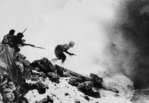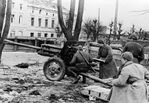Great War (Vasarden): Difference between revisions
No edit summary |
No edit summary |
||
| Line 71: | Line 71: | ||
* Apelia placed under [[Tieradan occupation of Apelia|Tieradan occupation]] | * Apelia placed under [[Tieradan occupation of Apelia|Tieradan occupation]] | ||
* Luepola, Apelia, Granzery lose all overseas colonies and territories | * Luepola, Apelia, Granzery lose all overseas colonies and territories | ||
* Creation of the [[Congress of Nations]] | |||
* Rise of [[Tierada]], [[Vierzland]], and [[Vonzumier]] as {{wp|Nuclear weapon|nuclear-armed}} {{wp|Superpower|superpowers}}; beginning of the [[Silent War]] | |||
| status = | | status = | ||
| combatants_header = Belligerents | | combatants_header = Belligerents | ||
Revision as of 09:22, 11 January 2020
This article is incomplete because it is pending further input from participants, or it is a work-in-progress by one author. Please comment on this article's talk page to share your input, comments and questions. Note: To contribute to this article, you may need to seek help from the author(s) of this page. |
| Great War | |||||||
|---|---|---|---|---|---|---|---|
| |||||||
| Belligerents | |||||||
| Allianz | Coalition | ||||||
| Commanders and leaders | |||||||
|
and others... |
and others...
| ||||||
| Strength | |||||||
|
Total: ? | Total: ? | ||||||
The Great War, also known in Vierz-speaking countries as the World War (Weltkrieg), was a global war fought between 1942 and 1948. The conflict was largely fought between the Socialist International Coalition, led by Luepola, Granzery and Apelia, and the Allied Powers, led by the Vierz Empire, Vonzumier and Tierada. The war resulted in the mobilization of some 90 million military personnel in over 20 countries, marking the formation of a state of total war. It is estimated that between 70 to 80 million people died, making it the deadliest war in human history. The war saw the mass deployment of chemical weapons on nearly all fronts and untold numbers of civilian deaths as a result of widespread starvation, disease, and strategic bombing.





